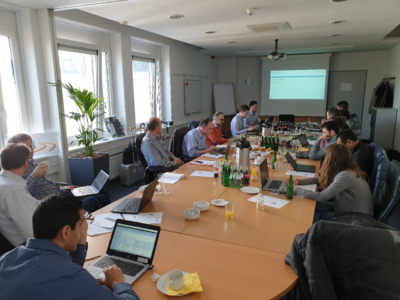 On 20th and 21st of March 2019, the Institute for Automotive Engineering (ika), one of our HEADSTART partners, hosted the first technical workshop of the project in Aachen, Germany. It was a two-day workshop including sessions on Work Package 1 ´Use cases and requirements´ and Work Package 2 ´Test, validation and certification methodologies and procedures´.
On 20th and 21st of March 2019, the Institute for Automotive Engineering (ika), one of our HEADSTART partners, hosted the first technical workshop of the project in Aachen, Germany. It was a two-day workshop including sessions on Work Package 1 ´Use cases and requirements´ and Work Package 2 ´Test, validation and certification methodologies and procedures´.
Participating in this event, the HEADSTART consortium, had the opportunity to discuss the latest developments in the CAD (Connected and Automated Driving) sector as well as the actions to take place within the project. Within the first day, a practical session took place. The HEADSTART partners ika, VEDECOM, IDIADA, ICCS, PILDO, TME, ViF, BASt, CRF, SAFER and ERTICO reviewed the current status of the state-of-the-art analysis. This included: overview on terminology and taxonomy, projects, initiatives, legislation, tools, scenario definitions and methodologies as well as procedures for automated driving. The discussions during the second day of the meeting were focused on the exploration of the structure of user requirements of key user groups (technology developers, consumer testing and type approval) as a basis for HEADSTART use cases and establishing the methodology definition.
It was a very fruitful meeting that made clear that HEADSTART is quite an exceptional project among the various initiatives in the fields of transport and the information and communications technology (ICT), as it combines the know-how and concepts of many European and International initiatives and research projects like MOOVE, PEGASUS, ENABLE-S3, L3Pilot, AdaptIVe, PROSPEC, ENSEMBLE. Moreover, HEADSTART has the ambition to significantly improve the effectiveness of current testing, validation and certification methods for automated and connected vehicles, by integration of the following three Key Enabling Technologies (KET): Communication, cyber-security and positioning. Even if its main goal is not to impose the use of any specific software, data formats like OpenScenario and OpenDrive were analysed to support the definition of the data structure and the interfaces.
Concluding, these two days of effective collaboration and intense work put a strong basis for the future project activities like the preparation of the overall scenario-based HEADSTART methodology proposal for Connected and Automated Driving (CAD) testing and validation. This will be achieved by filling existing gaps and developing procedures and tools beyond the state-of-the-art. In particular, the output of the meeting serves as a good and promising starting point for the next in-person workshop at VEDECOM, in Paris, France. The second in-person brainstorming session, planned for April 2019, will be fully dedicated to the definition of project use-cases and scenarios.
